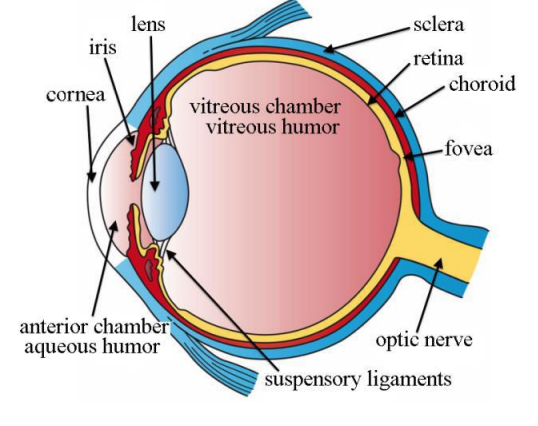Diabetes Mellitus and Your Eyes
This leaflet explains how diabetes mellitus may affect your eyes. It will help you to understand the examination and the care that you will receive.
If you would like additional information about the eye, and what effect diabetes has on your eyes, please speak to one of the doctors or nurses. They will be more than happy to help.
Diabetes mellitus
People living with diabetes mellitus have higher than normal levels of sugar in the blood stream. These high sugar levels can damage blood vessels throughout the body, including the blood vessels inside the eyes. Healthy blood vessels are essential for a healthy retina and best vision.
The retina is the delicate, specialised layer that lines the inside of the eyeball and with which we actually see. The macula is the central part of the retina, and at its centre, lies the fovea. The macula is essential for our fine vision so we can read small print and see people’s faces.

There are two main problems that can occur with the retinal blood vessels in diabetes mellitus:
Diabetic macular oedema: The high sugars in diabetes can affect the normal tight control of fluids that constantly flow between the retina and the blood stream. The smallest retinal blood vessels in diabetes can become leaky, causing the macula to become swollen (oedema). A swollen macula cannot work properly so the central sight in that eye may become distorted or blurred.
Proliferative diabetic retinopathy – The high blood sugars in diabetes can cause the smallest of retinal blood vessels to shut down and close up over time. The retina then becomes starved of essential nutrients and tries to make new blood vessels grow by producing special chemicals inside the eye. This abnormal new blood vessel growth inside the eye is called proliferative diabetic retinopathy. Unfortunately, these new blood vessels do not work effectively and do not help supply the retina with nutrients. However, they can cause problems to the sight if left untreated by bleeding or pulling and detaching the retina.
How can I best protect my eyes and eye sight?
Problems with the eye sight are not an inevitable outcome for people living with diabetes mellitus. There are many ways in which you can help to reduce the chances of having problems with your eyes and vision:
- Keep your blood sugar levels as near normal as possible: A number of large research studies have clearly shown that people with diabetes who manage to keep their sugar levels nearer normal levels have a lower risk of developing eye complications. Keep in contact with the diabetic team who are helping you to manage your diabetes, whether at your family doctor’s surgery or the hospital. Attend your appointments, get your blood tests done and, if you are struggling, ask for their help.
- Have your eyes checked and examined regularly: Damage to the blood vessels in your eye can become severe before the damage actually affects your vision. Or put another way, changes in the vision, such as blurring or floaters, can be a late symptom of marked diabetic damage to the eyes. These diabetic changes can only be picked up by examination of the retina on the inside of the eye. Anyone above the age of 12 with a diagnosis of diabetes mellitus (whether type 1 or 2), is offered eye examination by photographic screening a minimum of once a year by the community Diabetic Eye Screening Programme. If diabetic changes are seen on these photographs, you may be referred to your local
hospital eye clinic for further assessment and treatment if needed. The annual diabetic screening photographs are separate from your optician appointment for spectacles, eye pressure check etc and you should continue to attend your optician as normal. - Have a healthy diet and exercise regularly: Eating a healthy diet will help you to keep your blood sugar nearer to normal levels and help keep your weight down. Regular exercise will also help keep your blood sugars, weight and blood pressure down and improve or maintain your
mobility. All of these help to protect the health of the blood vessels throughout your body, including those in your eyes. - If you smoke, consider stopping: Smoking damages blood vessels. Diabetes damages blood vessels. If you do smoke, do you think of yourself as a life-long smoker? If not, have you considered trying to stop smoking?
Where can I go for further support and advice?
- Your usual diabetic care team either through your GP surgery or the hospital.
- The Dorset Council “LiveWell” programme offers free advice and coaching on getting active, weight management, stopping smoking and alcohol consumption. Contact them on 01305 233105, freephone 0800 840 1628 or visit www.livewelldorset.co.uk
- Diabetes UK provides a wide range of information, support and advice for people living with diabetes mellitus. Contact them on their helpline 0345 1232399 or visit www.diabetes.org.uk
- The Dorset Diabetic Eye Screening Programme team are happy to answer queries that you might have about your community eye screening or the outcomes of these appointments. They can be contacted by phone on 01305 898600 or email enquiries.despdorset@nhs.net. Further information, including access to leaflets on eye screening and diabetic retinopathy, are available from their website at www.despdorset.co.uk
- If you have had sight loss due to diabetes, The Dorset Blind Association can be contacted on 01202 712865 or via their website at www.dorsetblind.org.uk. They can provide emotional and practical support. Anyone can contact them directly – you do not have to have had severe sight loss to contact them, nor do you have to be formally registered as sight-impaired.
About this leaflet
Author: Miss Lucy Howe, Consultant Ophthalmologist
Written: March 2021
Approved: June 2021
Review date: June 2024
Edition: v1
If you have feedback regarding the accuracy of the information contained in this leaflet, or if you would like a list of references used to develop this leaflet, please email patientinformation.leaflets@dchft.nhs.uk
Print leaflet